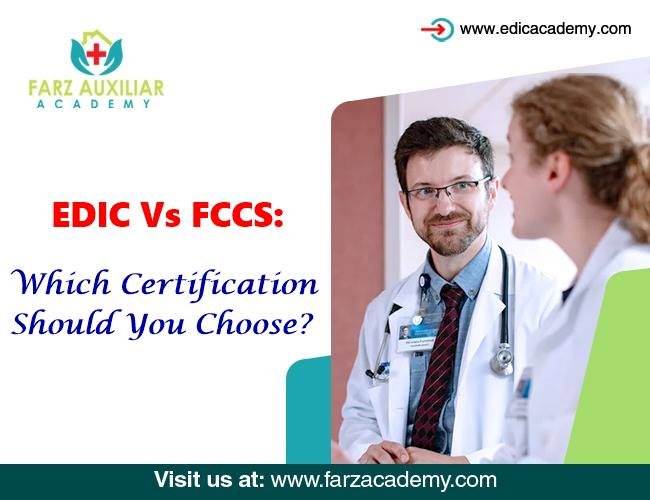Are you interested in advancing your career in critical care medicine? As a medical professional, you may be considering various certification options to demonstrate your expertise and enhance your credibility. Two prominent certifications in the field of critical care are the EDIC (European Diploma in Intensive Care) exam and FCCS (Fundamental Critical Care Support) certification.
In this article, we will compare these two certifications, examining their purpose, content, format, eligibility criteria, and more. By the end, you’ll have a clearer understanding of which certification may be the right choice for you.
Introduction:
Critical care medicine plays a crucial role in saving lives and improving patient outcomes. It requires specialized knowledge, skills, and competencies. Both the EDIC exam and FCCS certification aim to validate the proficiency of healthcare professionals in this field. Let’s delve deeper into each certification to understand its significance.
Understanding EDIC Exam and FCCS:
The EDIC exam is an internationally recognized certification offered by the European Society of Intensive Care Medicine (ESICM). It is designed for physicians who have completed their training in intensive care medicine and wish to demonstrate their expertise in this field. On the other hand, the FCCS certification is provided by the Society of Critical Care Medicine (SCCM) and targets healthcare professionals, including physicians, nurses, and respiratory therapists, who have limited experience in critical care.
EDIC vs EDAIC
Purpose of the EDIC Exam and FCCS:
The primary purpose of the EDIC exam is to assess a candidate’s knowledge, clinical skills, and ability to provide high-quality care in intensive care units. It validates the competence of physicians in critical care medicine and enhances their professional standing. The FCCS certification, on the other hand, focuses on providing fundamental knowledge and skills necessary to recognize and stabilize critically ill patients in non-intensive care settings.
Exam Structure and Format:
The EDIC exam consists of two parts: a written examination(EDIC Part 1 exam) and a practical examination(EDIC Part 2 Exam). The written part comprises multiple-choice questions, while the practical examination evaluates clinical skills through patient scenarios and simulations. The FCCS certification involves a comprehensive course that combines lectures, skill stations, and simulations to provide hands-on training in critical care scenarios.
Content Covered in the EDIC Exam and FCCS:
The EDIC exam covers a wide range of topics, including respiratory, cardiovascular, neurological, and renal systems, as well as infection control, ethics, and research methods. It assesses the candidate’s ability to diagnose and manage critically ill patients effectively.
The FCCS certification focuses on essential concepts in critical care, such as airway management, mechanical ventilation, shock management, and hemodynamic monitoring.
Eligibility Criteria:
To be eligible for the EDIC exam, physicians must have completed their training in intensive care medicine and have an appropriate level of clinical experience.
The FCCS certification does not have strict eligibility criteria, making it accessible to a broader range of healthcare professionals. It is particularly beneficial for individuals seeking to acquire foundational knowledge in critical care.
Preparation Strategies for the EDIC Exam and FCCS:
Preparing for these certifications requires a structured approach. For the EDIC exam, candidates should focus on building a strong foundation in critical care medicine, reviewing relevant textbooks, and practicing clinical scenarios. Joining study groups and attending specialized courses can also enhance preparation.
As for the FCCS certification, attending the comprehensive course and actively participating in hands-on training sessions are essential for success.
Benefits of Obtaining the EDIC Certification:
Achieving the EDIC certification signifies your expertise in critical care medicine and can open doors to career advancement opportunities. It demonstrates your commitment to excellence and may increase your chances of securing prestigious positions in renowned medical institutions. Additionally, it provides networking opportunities with fellow certified intensivists and allows you to contribute to the advancement of critical care knowledge and research.
EDIC Exams – Challenges and Solutions
Benefits of Obtaining the FCCS Certification:
The FCCS certification offers numerous benefits for healthcare professionals seeking to expand their critical care skills. It provides a solid foundation in essential concepts and procedures, making it suitable for professionals working in emergency departments, surgical wards, and other non-intensive care settings. The certification enhances patient safety by ensuring that healthcare providers are well-equipped to recognize and initiate appropriate interventions for critically ill patients.
EDIC vs FCCS: Key Differences
While both certifications focus on critical care medicine, there are several key differences between the EDIC exam and FCCS certification.
Firstly, the EDIC exam is tailored for physicians specializing in intensive care, whereas the FCCS certification is more inclusive, catering to a broader range of healthcare professionals.
Additionally, the EDIC exam evaluates a candidate’s knowledge and clinical skills through a rigorous examination process, whereas the FCCS certification emphasizes hands-on training and practical application of critical care concepts.
Which Certification Should You Choose?
Choosing between the EDIC exam and FCCS certification depends on your career goals, level of experience, and area of specialization. If you have completed your training in intensive care medicine and wish to demonstrate your expertise as a physician in this field, pursuing the EDIC certification is the ideal choice. On the other hand, if you are a healthcare professional seeking to acquire foundational critical care knowledge and skills, the FCCS certification will provide you with the necessary training.
Success Tips for the EDIC Exam and FCCS:
To succeed in either certification, it’s essential to dedicate ample time for preparation. Create a study schedule, focus on understanding core concepts, and practice clinical scenarios. Utilize online resources, attend review courses, and seek guidance from experienced intensivists or critical care experts. Remember to stay organized, manage your time effectively, and maintain a positive mindset throughout your preparation journey.
Conclusion:
Obtaining a certification in critical care medicine can significantly boost your professional growth and open up new opportunities in your career. The EDIC exam and FCCS certification are both valuable credentials that validate your expertise in this field. Consider your career goals, level of experience, and preferred area of focus to make an informed decision. Whichever path you choose, continuous learning and dedication to providing exceptional care to critically ill patients will pave the way for your success.
FAQs:
- How long does it take to prepare for the EDIC exam or FCCS certification? Preparing for these certifications typically requires several months of focused study and preparation. The exact duration may vary depending on your prior knowledge and experience in critical care medicine.
- Are there any prerequisites for the FCCS certification?
No, the FCCS certification does not have strict prerequisites. It is open to healthcare professionals with limited experience in critical care who wish to enhance their knowledge and skills in this field. - Can I pursue both the EDIC certification and FCCS certification?
Yes, you can pursue both certifications if you meet the eligibility criteria for each. However, it’s important to consider the time and effort required for preparation to ensure you can effectively manage the demands of both certifications. - How often do I need to recertify for the EDIC exam or FCCS certification? Recertification requirements may vary for each certification. It is recommended to check the respective certification boards’ guidelines for the most up-to-date information on recertification.
- Are these certifications recognized globally?
Yes, both the EDIC certification and FCCS certification are internationally recognized credentials in the field of critical care medicine. They hold significant value and can enhance your professional standing globally.




